Cumberland School of Law offers opportunities for students to study abroad in England, Scotland and Iceland, and international students are invited study at Cumberland School of Law. Participating students gain international perspective by studying and living in a legal system and culture different than their own.
The deadline to apply for summer 2026 programs is March 1.
Cambridge, England
Cumberland School of Law has conducted study abroad programs in England since 1991, first at the University of Kent in Canterbury, then at Collingwood College at the University of Durham. The program was moved to Cambridge in 2006.
The program is designed to introduce students to international law, with particular emphasis on the legal systems of the U.K. and the European Union and explore their relationship in the shadow of Brexit. Students combine a one-week, one-credit course in the English Legal System and Law of the European Union with two elective two-credit courses of their choice for the remaining weeks of the program.
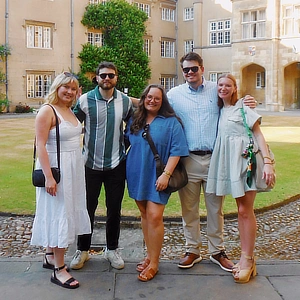 An array of opportunities exist to explore the rich historic legacy of Cambridge and England as a whole, whether the student chooses to join in curated program activities with faculty or pursue individual interests. Students wishing to expand their experience through travel to neighboring countries can do so over the two long weekends built into the academic schedule, as well as before classes begin or after the program ends.
An array of opportunities exist to explore the rich historic legacy of Cambridge and England as a whole, whether the student chooses to join in curated program activities with faculty or pursue individual interests. Students wishing to expand their experience through travel to neighboring countries can do so over the two long weekends built into the academic schedule, as well as before classes begin or after the program ends.
This program is put on through a partnership between Samford University Cumberland School of Law, Campbell University Norman Adrian Wiggins School of Law and Chapman University Fowler School of Law.
2026 Information
Pending ABA approval, the 2026 program will move from Sydney Sussex College to Jesus College at the University of Cambridge, and will run June 28-Aug. 1, 2026.
An opening reception for students and faculty will include an orientation about the college and the Cambridge area.
Consistent with the international law curriculum, students will travel to Strasbourg France, where they will tour the parliament of the European Union, the Council of Europe and the European Court of Human Rights.
The 2026 Cambridge program is limited to a maximum of 40 students.
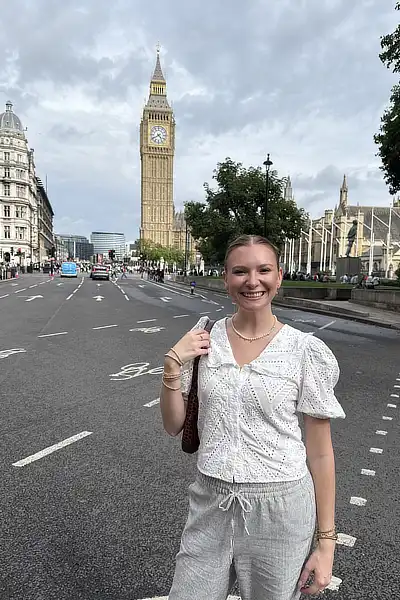
“Studying in Cambridge was one of my most rewarding and memorable experiences. I traveled with close friends, made new connections and explored five other countries on the weekends. Our courses were dynamic and thought-provoking. The knowledge I gained has served me academically and professionally. Every employer I’ve interviewed with this fall has asked me about the trip, and it has become a meaningful point of connection.”
— Lyndsey Stott
Curriculum
All students take the one-credit course and final, The English Legal System, occurring on the Monday and Tuesday of the first week and the Monday of the second week of the program. Each student chooses two elective courses for the remainder of the program, which will begin on July 7. Students are encouraged to visit the Municipal Court in Cambridge.
During the second and third week of classes there will be no classes on Fridays to provide three-day weekends for travel or study. The last day of classes will occur on July 29 and final examinations will be conducted on July 30 and 31 for the elective courses. Students may anticipate examinations for each course to be comparable to law exams administered in American Bar Association approved law schools in the United States. Exam papers are handwritten by students. The professor responsible for each course will both write and grade the applicable examination.
The English Legal System (1)
This course provides students with an overview of the English Legal System as one of the constituent legal jurisdictions of the U.K., how it is influenced by the European Union and how the U.K. functions without a written constitution. The development of European Union law and human rights law and recent reforms of the highest court of the land will be considered. The course will consider the effect of the U.K. leaving the European Union. Some topics will be considered on a comparative basis.
Shakespeare and the Law (2)
This course acquaints the student with the interdisciplinary field of Shakespearean and legal studies. An innovative methodology of trial work and close textual reading is employed. No dramatic or literary experience is required. The class will view trials in Shakespeare’s plays through live performances by the Cambridge Shakespeare Festival and the Globe Theatre in London. This hands-on course is a unique opportunity to experience the drama of the law while in the land of Shakespeare.
Global Issues in Education, Equality and Human Rights (2)
In this course, students will examine Article 26 of the Universal Declaration of Human Rights along with portions of subsequent global human rights treaties. Students will develop an understanding of the origins and evolution of international human rights law and how this body of law addresses issues of gender, children of war, oppressed classes, and race and disability, with a particular focus on access to education and the promotion of equality. Students will examine how different nations use distinct judicial, legislative, administrative, or other measures to secure these internationally recognized rights in compliance (or not) with international law and assess what means are available to enforce international law to protect human rights.
International and Comparative Copyright Law (2)
This course will examine international and comparative copyright law and policy. Its overall goal is for students to gain a global legal perspective through the lens of copyright. The course will survey various national systems of copyright, how they relate via international treaty, and how to handle choice-of-law issues among them. No prior copyright or intellectual property experience is required, but the course will complement other such courses, thereby expanding and sharpening students’ knowledge of the field.Art, Cultural Heritage and the Law: From the Holocaust to Ukraine (2)
This class will analyze issues relating to the world of art law and the preservation of cultural heritage. Starting with the massive theft of art by the Nazis before and during the Holocaust, we will trace the development of statutes, international bodies, and courts intended to mitigate the horrors of war, limit the destruction of art and culture, and provide for the repatriation of stolen art. What is the relationship between war crimes and genocide and the purposeful devastation of a people's heritage? We will examine the laws in different countries as well as international conventions; obligations of states and individuals; the problem of the illicit trafficking of antiquities and destruction of archaeological sites; and the role of museums, auction houses, and collectors. We will use case-studies taken from the U.S., Cambodia, Ukraine, Syria and elsewhere, to explore these ideas.
Faculty and Administration

Lisa Lukasik
Lisa Lukasik is a nationally recognized authority in education law and policy. She has experience as a public school teacher in the U.S. and Europe, as a lawyer on behalf of American public schools, and as a state hearing review officer twice appointed by the North Carolina Board of Education under the Individuals with Disabilities Education Act and state law to resolve appeals of special education due-process complaints. She now serves as an assistant professor of law at Campbell University where she teaches a variety of courses in civil rights litigation, public school law, special education law, and torts. Lukasik is an honors graduate of both Washington University in St. Louis, where she was a member of Phi Beta Kappa, and the University of North Carolina School of Law.
Tim McFarlin
Tim McFarlin specializes in intellectual property such as copyrights, trademarks and patents. His teaching philosophy centers on (1) empathy, i.e., putting ourselves in the shoes of others, like our clients and adversaries, (2) modeling a love of the law, and (3) practicality, i.e., how we can use the law to help people solve problems. In his scholarship, McFarlin has explored the disputes of artists like Mark Twain, Chuck Berry and Orson Welles, gleaning insights into copyright law and the concept of authorship. Prior to teaching, McFarlin’s legal practice focused on civil litigation, obtaining winning verdicts for clients as both first- and second-chair trial counsel. He earned his JD from St. Louis University School of Law and bachelor’s degrees in history and political science from the University of Missouri.
Brian Rose-Smith
Brian Rose-Smith is a graduate of the University of East Anglia and the College of Law, London, and was admitted as a solicitor in 1975. He practiced as a criminal lawyer for 40 years until 2015 and conducted cases at all levels from the magistrates’ courts to the House of Lords as it then was, now the Supreme Court. As a defense attorney he specialized in asset forfeiture, confiscation and serious fraud and carried out investigations and inquiries in many foreign jurisdictions including the Arab Emirates, the Caribbean and countries of the European Union. He has also lectured on the law of confiscation at the practice where he worked as part of a program of continuing education. Since 2015 he has been involved in the study of medieval history at the University of Cambridge and the University of East Anglia.
Kimberly R. West
Kimberly R. West received her JD from The University of Alabama School of Law in 1983. After graduation, West served as a law clerk to the Hon. Frank M. Johnson Jr., U.S. Circuit Court judge for the 11th Circuit Court of Appeals. She is a partner in the law firm of Wallace Jordan Ratliff & Brandt in Birmingham, Alabama, where she practices pharmaceutical and mass tort litigation. In 2011, she was awarded a master’s degree in English Literature from the Sewanee School of Letters. West is a member of the Shakespeare Association of America, the Shakespeare Theatre Association and the International Shakespeare Association. West teaches Shakespeare and Trial Advocacy at Cumberland School of Law.
John Hall
Professor John Hall is a native of England. He has a doctorate in modern history from Oxford University and a JD from Stanford Law School. He has been a professor at Chapman University's Fowler Law School for two decades, during which time he has conducted human rights work in Cambodia, the Philippines, Uganda, and assorted other places. Most recently he was in Kharkiv, Ukraine, where he investigated Russian war crimes relating to the destruction of artistic and cultural heritage. At Fowler, Hall teaches International Law, Art Law, Employment Law, and Torts.
Kerry P. McInerney
Kerry McInerney is administrative faculty and the director of graduate and international programs at Cumberland School of Law. McInerney is the former managing partner of Alabama and Mississippi Litigation for McCalla Raymer Leibert Pierce LLC. He joined McCalla after spending 20 years at Sirote & Permutt PC, now Dentons Sirote, where he devoted his career to financial services litigation and compliance. McInerney is an award-winning author and frequent lecturer and panelist on issues related to the financial services industry. McInerney is a graduate of Birmingham-Southern College (BA), Wayne State University (MA), and Samford University Cumberland School of Law (JD). McInerney will serve as program director while in England.
Admission Criteria
Program participation is limited to law students in good standing at American Bar Association approved law schools, graduates of approved law schools in their country of origin or residence, or members of the Bar.
All applications for admission must be accompanied by a $25 application fee which is non-refundable unless the application is rejected due to full enrollment, lack of sufficient student interest or domestic and/or international instability which is relevant to the program. A non-refundable deposit is required once the student is accepted. This deposit will be applied to housing and administration fees for students who do not withdraw from the program.
The program director recognizes that financial aid for legal studies may not be available until 10 days prior to the start of the program; hence, a deferred timeframe for payment, other than the application deposit, is satisfactory if the student has preregistered and informed the program director of an acceptable payment schedule.
Tuition and Fees
Application Fee: $25
This non-refundable fee begins the registration process, initiates participation in the program, and submits the student to the cancellation and refund policy.
Deposit: $375
Once admitted, a non-refundable deposit of $375 is due within 14 days of acceptance. Students failing to timely pay the deposit in full will be withdrawn from the program. The deposit will be applied to the housing and administration fees for students who do not withdraw from the program.
Tuition: $4,526
The maximum number of credit hours allowable pursuant to American Bar Association regulations for a program of this duration is five hours. The student will, therefore, be allowed to register for the one-hour course and two of the four two-hour courses offered.
Housing and Administration: $6,000
Pending ABA approval, students will be housed in Jesus College. Double rooms are not available to students. Thus, visiting family members will need to make a hotel reservation. Breakfast and lunch is included for registered students each class day.
Lodging will be provided from June 28 and rooms at Jesus College must be vacated prior to 9:30 a.m. on Aug. 1. Dinner may be purchased in one of the many local restaurants convenient to the lodging. Dinner, other than the opening and closing dinners, and all other meals are the responsiblity of the student.
Samford Global Office Foreign Fee: $100
University Graduate Program Fee: $300
Travel Insurance: $80.50
Total: $11,031.50
Financial Aid
Financial aid is available for qualified students. Questions regarding the financial aid process can be directed to Sheri Garrett in the Samford One Stop at 205-726-2905 or cgarret6@samford.edu. It is the student’s responsibility to provide a FAFSA and all necessary forms to receive financial aid to the university financial aid office.
General and Medical Release Forms
The university requires all students to complete general and medical releases from liability prior to participating in any university-sponsored travel or study abroad program. All forms must be submitted before an application is considered complete. Failure to submit the required forms will result in a student's enrollment in the summer study abroad program to be withdrawn.
Enrollment
Students must submit an application prior to the deadline to be considered for a seat. Accepted students will receive an email notifying them that a seat has been reserved, pending the student’s submission of all required documents, payments due, and verification by their institution of good academic standing.
Accessibility
The University of Cambridge strives to make the campus accessible to all users. The university acknowledges that students may encounter accessibility issues to certain facilities due to the ancient layout of the town and parts of the campus. Cumberland School of Law has no control over accessibility features not afforded by the University of Cambridge and makes no representations in that regard.
Frequently Asked Questions
Cancellation and Withdrawal
If the course offerings change (not including a title change) or there are other significant changes to the program’s operation, these changes will be announced on the program’s website and students will be notified via email. Students already enrolled will have the option to withdraw from the program within two weeks from the date the change is announced by notifying Kerry McInerney, kpmciner@samford.edu, of the decision to withdraw. Any payments already made will be fully refunded within 28 days.
Student safety is a priority and students should be aware that domestic and/or international instability in a region or country can result in unexpected changes to or cancellation of a study abroad program where the university deems it necessary. The program also may be cancelled if there is insufficient enrollment or if unforeseen events make travel or staying in Cambridge unsafe. If this happens before the program begins, all deposits and tuition will be refunded within 28 days from the date the program is cancelled. Notifications will be sent via email and the website.
If the program must be cancelled after classes begin, refund(s) will be issued on a prorated basis for all tuition, fees, and housing costs, less the days already spent at the time of cancellation. Email will be the sole form of official communication for program cancellation.
Course Materials
On or before April 21, students will be provided with a list of course materials and/or textbooks necessary for program courses. This information will be provided via email. Students will need to bring their personal electronic devices for note taking and research, as may be needed. There are supply stores nearby should classroom supplies be necessary.
Credits and Grading
The credit hour calculation is based on the criteria specified by the ABA Criteria for Approval of Foreign Summer and Intersession Programs. For Cumberland Law students, the acceptance of credit or grade for any course taken in the program are governed by Cumberland’s Academic Standards policies and procedures. For non-Cumberland students, the acceptance of credit or grade for any course taken in the program is governed and subject to determination by the student’s home school. Class work and grading is treated with the same criteria and high standards as class work and grading held on the Cumberland School of Law campus.
Credit Cards and Passports
Before leaving the U.S., we recommend notifying credit and debit card companies of upcoming travel plans in order to avoid the inconvenience of transactions being declined due to fraud prevention. Most banks provide notification options via their online portals or bank app. Additionally, be sure to make a couple of copies of your passport to leave with a loved one in the U.S. and one in a safe place to travel with you. This copy will be very useful in the event your passport is misplaced and you need a new one.
Flights
Students are responsible for arranging their own flights to England and transportation to Jesus College at the University of Cambridge. Students often travel from the airport to Cambridge by way of England’s efficient public transit systems. London’s Heathrow airport (airport code LHR) is approximately 30 minutes by way of the London Underground subway system (the “Tube”) to London’s King’s Cross train station, which is approximately 45 minutes from Cambridge by train. The campus can also be reached by bus, taxi, or ride-sharing platforms, such as Uber.
Safety While Abroad
For the latest updates on travel advisories and safety information while in England, visit the U.S. Department of State - Bureau of Consular Affairs website for U.K. travel information. This resource provides important details on health and safety, entry requirements, and any current travel advisories.
Please visit Samford Global for more information about health and safety while abroad. Students will be required to download the “Smart Traveler” app from the U.S. Department of State before departing for the program.
Contact Us
With questions, contact Kerry McInerney: kpmciner@samford.edu or 205-726-2543.
Edinburgh, Scotland
2026 Information
Now in its third year, this program will host up to 24 students at the University of Edinburgh, in Edinburgh, Scotland, June 1-July 1, 2026.
Edinburgh is the capital of Scotland and home of two UNESCO World Heritage sites. The University of Edinburgh is ranked by U.S. News & World Report as the 39th best global university.
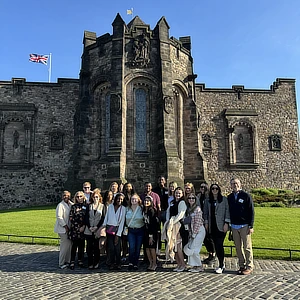 Known as the birthplace of golf, Scotland also boasts some of the world’s most amazing history, an abundances of castles, a unique culture and spectacular scenery. By train, Edinburgh is only 45 minutes from Glasgow, Scotland’s largest city, and four hours from London. With three long weekends built into the program, students can choose to explore Scotland, England and Wales, and other countries throughout Europe.
Known as the birthplace of golf, Scotland also boasts some of the world’s most amazing history, an abundances of castles, a unique culture and spectacular scenery. By train, Edinburgh is only 45 minutes from Glasgow, Scotland’s largest city, and four hours from London. With three long weekends built into the program, students can choose to explore Scotland, England and Wales, and other countries throughout Europe.
Special features:
- Intentionally small student cohort to facilitate experiential learning;
- Emphasis on advocacy skills and knowledge;
- Private tour of the Scottish Parliament led by a member of Parliament;
- Opportunity to observe proceedings in the Sheriff’s Court of Edinburgh with a private presentation from a sitting sheriff (trial judge);
- Opportunity to participate in a continuing legal education seminar alongside both U.S. and U.K. attorneys; and
- Students will have the option to travel to Strasbourg, France, joining the Cambridge and Icleand students for a tour of the Parliament of the European Union, the Council of Europe, and the European Court of Human Rights.

"The study abroad program was one of the most meaningful parts of my legal education so far. The courses helped me grow more confident in my skills and pushed me to think on my feet in a new environment. I had the chance to build close relationships with professors, which made the experience even more impactful. On top of that, being able to explore another part of the world while continuing my studies gave me a broader perspective that I know will shape the kind of lawyer I become.” — Makayela Bouldes
Curriculum
Students receive a total of five credit hours including one credit hour course required for all students and two electives totaling four hours of experiential credit:
The Scottish Legal System (1, required)
This comparative law course explores the development and functioning of the legal system in Scotland, the role of the judiciary, and the current contrast to and interface of the Scottish legal system within the broader U.K. and that of foreign nations, such as the U.S. and the European Union. Students will come to understand the practical and academic aspects of the emerging constitutional basis for the European Union and its effects on the Scotland system of justice in a post-Brexit landscape.
Pre-Trial Practice (2, experiential)
The Art of Persuasion (2, experiential)
Classroom lectures and experiential learning exercises draw from advocacy, literature, public speaking, journalism and acting to learn strategies and techniques designed to improve their ability to persuade. Students will learn the 5 P's of Professor Mac's Persuasion Process and apply them to written assignments, classroom exercises and discussions. Students will learn the impact of story, body language, body placement and voice on the message they seek to convey. The objective of the course is to enhance the students’ presence through increased awareness and command of their bodies and voices as the instruments of advocacy. From the courtroom to the boardroom to the conference room, students will discover how to turn any presentation into a command performance.
Foundations of Advocacy: Analysis & Storytelling, Civil (2, experiential)
In this course, students will learn how to present case facts in a way that will trigger memory recall, maintain attention and build a connection with the jury. This course will teach students how to effectively analyze a civil case using applicable case law, statutory law and/or regulatory law to provide a framework for building a persuasive case theory. Students will learn the importance of developing effective case strategy based on their analysis of the legal framework and issues presented all while maintaining the foundation of developing a persuasive story based upon the knowledge they will gain of the neurobiology of persuasion. Students will be evaluated through means of a written case analysis memorandum and then will be tasked with constructing and delivering effective opening statemetns ath encompass both their legal analysis and their understanding of the tools they learn .
Motions and Objections (2, experiential)
This course gives students the opportunity and challenge of applying the rules of evidence in the same fashion as practicing lawyers: via written motions, oral argument and courtroom objections. This course involves participation in simulations during class sessions and written work outside of class. Topics include relevance, character evidence, hearsay and expert testimony.
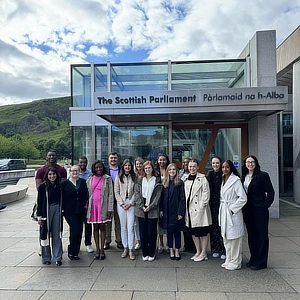 CLE: The Art of Advocacy
CLE: The Art of Advocacy
Cumberland School of Law's third annual international CLE conference, The Art of Advocacy, will be held at the Balmoral Edinburgh, June 28–30, 2026. The CLE offers practicing lawyers the persuasive advocacy techniques that modern lawyers need to represent their firms and their clients from the courtroom to the conference room to the board room. To conclude the study abroad program, students will have the opportunity to sit alongside practicing attorneys from the U.S. and the U.K. in this immersive, two-day program. In 2026, conference will explore topics pertaining to advocacy in the age of A.I.
Faculty and Administration
Ramona C. Albin, Associate Professor of Law
Before joining the Cumberland School of Law faculty in 2017, Ramona Albin worked as an assistant U.S. attorney for the Northern District of Alabama for more than 10 years. Albin handled criminal trial and appellate litigation. She was also chief of the Appellate Division and argued numerous cases before the Eleventh Circuit Court of Appeals. Earlier in her career, Albin worked as an assistant district attorney in Texas and Massachusetts. Albin graduated from Wesleyan University, received her JD from the University of Texas School of Law, and a Master of Public Health from Boston University.
Lane Woodke
Lane Woodke teaches classes related to civil procedure and litigation, as well as employment discrimination at Cumberland School of Law. Before joining the Cumberland faculty, Woodke worked as an assistant U.S. attorney for the Northern District of Alabama for more than 21 years. She served as the chief of the Civil Division for her last 11 years. Woodke handled all aspects of Civil Litigation for the Northern District of Alabama. Earlier in her career, Woodke worked at Huie, Fernambucq & Stewart in Birmingham, Alabama. Prior to that she clerked for the Honorable Sharon Lovelace Blackburn in the United States District Court for the Northern District of Alabama. She earned a BA in political science from The University of Alabama and a JD from The University of Alabama School of Law.
Kerry P. McInerney
Kerry McInerney is administrative faculty and the director of graduate and international programs at Cumberland School of Law. McInerney is the former managing partner of Alabama and Mississippi Litigation for McCalla Raymer Leibert Pierce LLC. He joined McCalla after spending 20 years at Sirote & Permutt PC, now Dentons Sirote, where he devoted his career to financial services litigation and compliance. McInerney is an award-winning author and frequent lecturer and panelist on issues related to the financial services industry. McInerney is a graduate of Birmingham-Southern College (BA), Wayne State University (MA), and Samford University Cumberland School of Law (JD). McInerney will serve as the program director while in Scotland.
Gillian More
Gillian More is a former prosecutor in the High Court of Justiciary Edinburgh where she held the position of advocate deputy in the Lord Advocate’s Department, Crown Office Edinburgh. A lifelong prosecutor, she retired after a career spent in public service where she held multiple positions to include time as crown prosecutor in the High Courts of Justice. She has taught advocacy worldwide, for the National Institute of Trial Advocacy, Stetson University College of Law, Scottish Prosecution College Glasgow, University of Edinburgh, and courses in Ukraine and Istanbul. Recognized for her natural teaching skills, More has served as an integral part of Stetson’s Educating Advocates program and recently taught in Stetson’s overseas programs in Ireland and in London. She has also taught in the University of Strathclyde’s LLM program. She is a lifelong resident of Scotland and serves as the resident Scottish comparative law professor for the program.
Admission Criteria
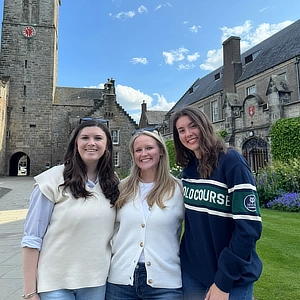 Program participation is limited to law students in good standing at an American Bar Association approved law school, graduates of approved law schools in their country of origin or residence, or members of the Bar.
Program participation is limited to law students in good standing at an American Bar Association approved law school, graduates of approved law schools in their country of origin or residence, or members of the Bar.
All applications for admission must be accompanied by a $25 application fee which is non-refundable unless the application is rejected due to full enrollment, lack of sufficient student interest or domestic and/or international instability which is relevant to the program. A non-refundable deposit is required once the student is accepted. This deposit will be applied to housing and administration fees for students who do not withdraw from the program.
The program director recognizes that financial aid for legal studies may not be available until 10 days prior to the start of the program; hence, a deferred timeframe for payment, other than the application deposit, is satisfactory if the student has preregistered and informed the program director of an acceptable payment schedule.
Tuition and Fees
Application Fee: $25
This non-refundable fee begins the registration process, initiates participation in the program, and submits the student to the cancellation and refund policy.
Deposit: $375
Once admitted, a non-refundable deposit of $375 is due within 14 days of acceptance. Students failing to timely pay the deposit in full will be withdrawn from the program. The deposit will be applied to the housing and administration fees for students who do not withdraw from the program.
Tuition: $4,437
The maximum number of credit hours allowable pursuant to American Bar Association regulations for a program of this duration is five hours. The student will, therefore, be allowed to register for the one-hour course and two of the four two-hour courses offered.
Housing and Administration Fees: $6,875
Students will be housed at Pollock Halls at the University of Edinburgh in single ensuite rooms. This fee includes housing, breakfast and lunch on class days. With the exception of the opening and closing dinners, all other meals are the responsibility of the student.
Samford Global Office Foreign Fee: $100
University Graduate Program Fee: $300
Travel Insurance: $80.50
Total: $11,817.50
Financial Aid
Financial aid is available for the Scotland summer study abroad program for qualified students. Questions regarding the financial aid process can be directed to Sheri Garrett in the Samford One Stop at 205-726-2905 or cgarret6@samford.edu. It is the student’s responsibility to provide a FAFSA and all necessary forms to receive financial aid to the university financial aid office.
General and Medical Release Forms
The university requires all students to complete general and medical releases from liability prior to participating in any university-sponsored travel or study abroad program. All forms must be submitted before for your application is complete. Failure to submit the required forms will result in your enrollment in the Scotland summer study abroad program to be withdrawn.
Enrollment
The Scotland summer study abroad program is intentionally small and limited to no more than 24 students. Students must submit an application prior to the deadline to be considered for a seat. Accepted students will receive an email notifying them that a seat has been reserved, pending the student’s submission of all required documents, payments due, and verification of good academic standing at Cumberland School of Law.
Accessibility
The University of Edinburgh strives to make the campus accessible to all users. The University acknowledges that students may encounter accessibility issues to certain facilities due to the ancient layout of the town and parts of the campus. Cumberland School of Law has no control over accessibility features not afforded by the University of Edinburgh and makes no representations in that regard.
Frequently Asked Questions
Cancellation and Withdrawal
If the course offerings change (not including a title change) or there are other significant changes to the program’s operation, these changes will be announced on the program’s website and you will be notified via email. If you are already enrolled, you will have the option to withdraw from the program within two weeks from the date the change is announced by notifying Kerry McInerney, kpmciner@samford.edu, of your decision to withdraw. Should you choose to withdraw, any payments you’ve made will be fully refunded within 28 days.
 Student safety is a priority and students should be aware that domestic and/or international instability in a region or country can result in unexpected changes to or cancellation of a study abroad program where the university deems it necessary. The program also may be cancelled if there is insufficient enrollment or if unforeseen events make travel or staying in Edinburgh unsafe. If this happens before the program begins, all deposits and tuition will be refunded within 28 days from the date the program is cancelled. Notifications will be sent via email and the website.
Student safety is a priority and students should be aware that domestic and/or international instability in a region or country can result in unexpected changes to or cancellation of a study abroad program where the university deems it necessary. The program also may be cancelled if there is insufficient enrollment or if unforeseen events make travel or staying in Edinburgh unsafe. If this happens before the program begins, all deposits and tuition will be refunded within 28 days from the date the program is cancelled. Notifications will be sent via email and the website.
If the program must be cancelled after classes begin, refund(s) will be issued on a prorated basis for all tuition, fees, and housing costs, less the days already spent at the time of cancellation. Email will be the sole form of official communication for program cancellation.
Course Materials
On or before April 21, you will be provided with a list of course materials and/or textbooks necessary for your courses. This information will be provided via email. You will need to bring your electronic device for note taking and research as may be needed for your respective courses. There are supply stores nearby should you need classroom supplies.
Credits and Grading
The credit hour calculation is based on the criteria specified by the ABA Criteria for Approval of Foreign Summer and Intersession Programs. For Cumberland Law students, the acceptance of credit or grade for any course taken in the program are governed by Cumberland’s Academic Standards policies and procedures. For non-Cumberland students, the acceptance of credit or grade for any course taken in the program is governed and subject to determination by the student’s home school. Class work and grading is treated with the same criteria and high standards as class work and grading held on the Cumberland School of Law campus.
Credit Cards and Passports
Before you leave the U.S., we recommend notifying your credit and debit card companies of your upcoming travel plans in order to avoid the inconvenience of your transactions being declined due to fraud prevention. Most banks provide notification options via their online portals or bank app. Additionally, be sure to make a couple of copies of your passport to leave with a loved one in the U.S. and one in a safe place to travel with you. This copy will be very useful in the event your passport is misplaced and you need a new one.
Flights
Students are responsible for arranging their own flights to Edinburgh and transportation to Pollock Halls Campus at the University of Edinburgh. The Edinburgh airport (airport code EDI) is approximately 25-30 minutes from Pollock Halls Campus, 18 Holyrood Park Road, Edinburgh.
Safety While Abroad
For the latest updates on travel advisories and safety information while in Scotland, visit the U.S. Department of State - Bureau of Consular Affairs website for U.K. travel information. This resource provides important details on health and safety, entry requirements, and any current travel advisories. Be sure to review this information prior to your trip.
Visit Samford Global for more information about health and safety while abroad. You will be required to download the “Smart Traveler” app from theU.S. Department of State before departing for the program.
Contact Us
With questions, contact Kerry McInerney: kpmciner@samford.edu or 205-726-2543.
Reykjavik, Iceland
2026 Information
Now in its second year, our Iceland summer study abroad program will take place at the University of Iceland in Reykjavik, June 20-July 10, 2026. The program is centered on land use and planning and the impact of environmental law on the world’s ecosystems.
 Reykjavik, the capital of Iceland, is among the cleanest, greenest and safest cities in the world. Reykjavik is one of the leaders in renewable energy and Iceland is known for its sustainable sources of energy and use of geothermal and hydropower to reduce reliance on fossil fuels. Iceland also integrates sustainability models in other areas such as tourism, fisheries, transportation and Reykjavik is at the forefront of those efforts. Reykjavik is home to and surrounded by massive volcanos, extensive glaciers, bubbling geysers, and numerous waterfalls.
Reykjavik, the capital of Iceland, is among the cleanest, greenest and safest cities in the world. Reykjavik is one of the leaders in renewable energy and Iceland is known for its sustainable sources of energy and use of geothermal and hydropower to reduce reliance on fossil fuels. Iceland also integrates sustainability models in other areas such as tourism, fisheries, transportation and Reykjavik is at the forefront of those efforts. Reykjavik is home to and surrounded by massive volcanos, extensive glaciers, bubbling geysers, and numerous waterfalls.
Special features:
- An intentionally small student cohort of no more than 16 students;
- Tour of the Supreme Court of Iceland with a private Q & A with the president (chief justice) of the Supreme Court of Iceland;
- Tour of the Icelandic Ministry of Finance;
- Tour of the Geothermal Plant and Carbfix Borehole at Reykjavik Energy Plant;
- Tour of Hvammsvik Geothermal Pools; and
- The opportunity to travel to Strasbourg, France, to join students from the Cambridge and Edinburgh programs. There we'll tour the parliament of the European Union, the Council of Europe, and the European Court of Human Rights.
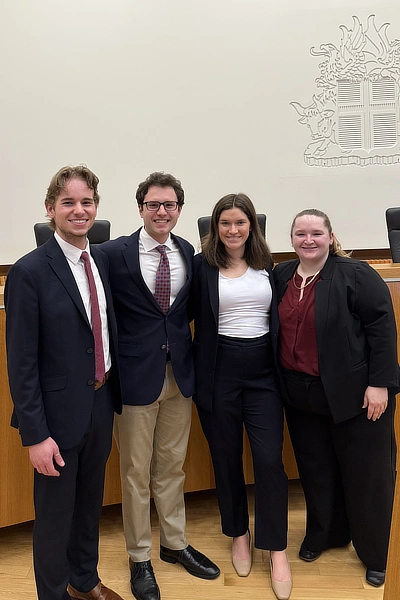
“I had a great experience in Iceland. Of all my courses, I enjoyed learning about the Icelandic legal system most of all, which is very different than U.S. law. This course provided me with a unique opportunity to confront these differences and reassess my understanding of the American legal system.” — Max Hudgins
Curriculum
Students receive a total of 3 credit hours comprising three 1 credit hour courses:
Comparative Land Use Law: The U.S. and Scandinavia (1)
The U.S. federal government is decentralized, with state and local governments largely dictating land uses. Nordic countries (at least some) are centralized, with national governments dictating the terms of land use. This course compares and contrasts the U.S. and Scandinavian approaches to land use planning and regulation while highlighting the pros and cons of each and the impact on their respective environments and natural resources.
Comparative Natural Resources Law: Forests and Fisheries in Iceland and the United States (1)
This comparative law course is designed to explore the similarities and differences between the United States of America's and Iceland's legal frameworks governing and approach to each nation's protection and management of two natural resources that, at least historically, were of fundamental importance to each country: timber resources and commercial fisheries.
The Icelandic Legal System (1)
This is a comparative law course designed to explore the differences between the Icelandic, E.U. and U.S. legal systems. The course looks at the priorities influencing the development of the respective legal systems and examines how each legal systems supports or impedes inevitable social change.
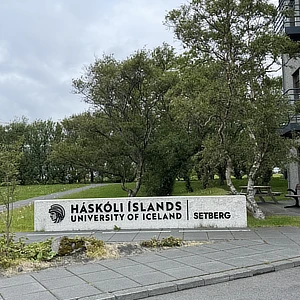
Faculty and Administration
Blake Hudson
Blake Hudson, dean and director of Cumberland School of Law's Land Use and Natural Resources Law Center, came to Cumberland in 2022 after serving as a professor of law and director of the Environmental Land Use and Real Estate Law Program at the University of Florida’s Levin College of Law. Hudson teaches courses related to property, environmental and natural resources law. His research focuses on the intersection of land use law, policy, and planning with natural resource management, with particular emphasis on the role of forest management in combating climate change and the implications of land development for sustainable natural resource management. His research has also centered on the complex role of private property rights and government institutions as solutions to common dilemmas and how federalism and constitutional structure have the potential to both complicate and resolve land use and natural resource management issues at the state, federal and international levels. He holds a bachelor’s degree from the University of Montevallo, a JD from Duke University School of Law, and a Master of Environmental Science and Policy from Duke’s Nicholas School of the Environment.
Jim Noles
Jim Noles is a professor of practice on the faculty at the Auburn University College of Forestry, Wildlife and Environment (CFWE). In addition to teaching courses in environmental law, property law, and risk management in parks, recreation, and outdoor activities, he is responsible for the college’s minor in Environmental Law. Prior to joining Auburn’s faculty, Noles practiced environmental law with a regional law firm based in Birmingham, Alabama, before co-founding his own firm. He is a graduate of the United State Military Academy, West Point, New York, and the University of Texas School of Law, Austin, Texas.
Siguduor Helgason, International Adjunct Professor
Helgason is currently associate counsel with the Confederation of Icelandic Businesses. Helgason attended the Commercial College of Iceland with majors in physics and natural science, University of Iceland with a Bachelor of Laws degree and Magister Juris degree. Helgason has served as a District Court attorney, associate counsel with juris, counsel for frigus, and associate counsel with Lagastod law firm. Helgason has taught law students at the University of Iceland in the areas of contracts, torts and procedure. Helgason has coached law students to participate in the Commercial College of Iceland competition from 2010-15 as well as participated as a student in the Nordic Moot Court competitions conducted in Swedish, Danish, and Norwegian. Helgason is fluent in Icelandic, English, German, Danish and Swedish.
Tona M. Hitson, Director of Law Student Services
Tona Hitson attended the University of Georgia, where she earned her BBA in finance at UGA's Terry College of Business. She then attended Cumberland School of Law where she earned her JD. While in law school, Hitson served as managing editor of the American Journal of Trial Advocacy, worked as a student member of the Center for Law and Civic education, and was a member of the Honor Court, among other honors. After working for a lobbying firm in Washington, D.C., she returned to Birmingham to work for a local litigation firm and then worked as associate counsel for AIG Baker Properties LLC. At Cumberland School of Law, Hitson is the director of student services and will serve as co-program director in Iceland.
Admission Criteria
Program participation is limited to law students in good standing at an American Bar Association approved law school, graduates of approved law schools in their country of origin or residence, or members of the Bar.
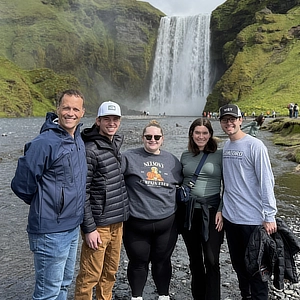 All applications for admission must be accompanied by a $25 application fee which is non-refundable unless the application is rejected due to full enrollment, lack of sufficient student interest or domestic and/or international instability which is relevant to the program. A non-refundable deposit is required once the student is accepted. This deposit will be applied to housing and administration fees for students who do not withdraw from the program.
All applications for admission must be accompanied by a $25 application fee which is non-refundable unless the application is rejected due to full enrollment, lack of sufficient student interest or domestic and/or international instability which is relevant to the program. A non-refundable deposit is required once the student is accepted. This deposit will be applied to housing and administration fees for students who do not withdraw from the program.
The program director recognizes that financial aid for legal studies may not be available until 10 days prior to the start of the program; hence, a deferred timeframe for payment, other than the application deposit, is satisfactory if the student has preregistered and informed the program director of an acceptable payment schedule.
Tuition and Fees
Application Fee: $25
This non-refundable fee begins the registration process, initiates participation in the program, and submits the student to the cancellation and refund policy.
Deposit: $375
Once admitted, a non-refundable deposit of $375 is due within 14 days of acceptance. Students failing to timely pay the deposit in full will be withdrawn from the program. The deposit will be applied to the housing and administration fees for students who do not withdraw from the program.
Tuition: $2,662
Students receive three credit hours towards graduation for classes taken during the Iceland summer study abroad program. Each student will be registered for three (3) one-hour courses.
Housing and Administration Fees: $6,000
Students will be housed at the University of Iceland Student Hostel in single ensuite rooms. This fee includes housing, breakfast and lunch on class days. With the exception of the opening and closing dinners, all other meals are the responsibility of the student.
Samford Global Office Foreign Fee: $100
University Graduate Program Fee: $300
Travel Insurance: $48.30
Total: $9,135.30
Financial Aid
Financial aid is available for the Iceland summer study abroad program for qualified students. Questions regarding the financial aid process can be directed to Sheri Garrett in the Samford One Stop at 205-726-2905 or cgarret6@samford.edu. It is the student’s responsibility to provide a FAFSA and all necessary forms to receive financial aid to the university financial aid office.
General and Medical Release Forms
The university requires all students to complete general and medical releases from liability prior to participating in any university-sponsored travel or study abroad program. All forms must be submitted before for your application is complete. Failure to submit the required forms will result in your enrollment in the Iceland summer study abroad program to be withdrawn.
Enrollment
The Iceland summer study abroad program is intentionally small and limited to no more than 16 students. Students must submit an application prior to the deadline to be considered for a seat. Accepted students will receive an email notifying them that a seat has been reserved, pending the student’s submission of all required documents, payments due and verification of good academic standing at Cumberland School of Law.
Accessibility
The University of Iceland strives to make the campus accessible to all users. Cumberland School of Law has no control over accessibility features not afforded by the University of Iceland and makes no representations in that regard.
Frequently Asked Questions
Cancellation and Withdrawal
If the course offerings change (not including a title change) or there are other significant changes to the program’s operation, these changes will be announced on the program’s website and you will be notified via email. If you are already enrolled, you will have the option to withdraw from the program within two weeks from the date the change is announced by notifying Kerry McInerney, kpmciner@samford.edu, of your decision to withdraw. Should you choose to withdraw, any payments you’ve made will be fully refunded within 28 days.
 Student safety is a priority and students should be aware that domestic and/or international instability in a region or country can result in unexpected changes to or cancellation of a study abroad program where the university deems it necessary. The program also may be cancelled if there is insufficient enrollment or if unforeseen events make travel or staying in Reykjavik unsafe. If this happens before the program begins, all deposits and tuition will be refunded within 28 days from the date the program is cancelled. Notifications will be sent via email and the website.
Student safety is a priority and students should be aware that domestic and/or international instability in a region or country can result in unexpected changes to or cancellation of a study abroad program where the university deems it necessary. The program also may be cancelled if there is insufficient enrollment or if unforeseen events make travel or staying in Reykjavik unsafe. If this happens before the program begins, all deposits and tuition will be refunded within 28 days from the date the program is cancelled. Notifications will be sent via email and the website.
If the program must be cancelled after classes begin, refund(s) will be issued on a prorated basis for all tuition, fees, and housing costs, less the days already spent at the time of cancellation. Email will be the sole form of official communication for program cancellation.
Course Materials
On or before April 21, you will be provided with a list of course materials and/or textbooks necessary for your courses. This information will be provided via email. You will need to bring your electronic device for note taking and research as may be needed for your respective courses. There are supply stores nearby should you need classroom supplies.
Credits and Grading
The credit hour calculation is based on the criteria specified by the ABA Criteria for Approval of Foreign Summer and Intersession Programs. For Cumberland Law students, the acceptance of credit or grade for any course taken in the program are governed by Cumberland’s Academic Standards policies and procedures. For non-Cumberland students, the acceptance of credit or grade for any course taken in the program is governed and subject to determination by the student’s home school. Class work and grading is treated with the same criteria and high standards as class work and grading held on the Cumberland School of Law campus.
Credit Cards and Passports
Before you leave the U.S., we recommend notifying your credit and debit card companies of your upcoming travel plans in order to avoid the inconvenience of your transactions being declined due to fraud prevention. Most banks provide notification options via their online portals or bank app. Additionally, be sure to make a couple of copies of your passport to leave with a loved one in the U.S. and one in a safe place to travel with you. This copy will be very useful in the event your passport is misplaced and you need a new one.
Flights
Students are responsible for arranging their own flights to Reykjavik and transportation to the Student Hostel at the campus of the University of Iceland. The Reykjavik (Keflavik) airport (airport code KEF) is approximately 25-30 minutes from campus, Hringbraut 29, Reykjavík 101, 5102828.
Safety While Abroad
For the latest updates on travel advisories and safety information while in Iceland, visit the U.S. Department of State - Bureau of Consular Affairs website for Iceland travel information. This resource provides important details on health and safety, entry requirements, and any current travel advisories.
Visit Samford Global for more information about health and safety while abroad. You will be required to download the “Smart Traveler” app from the U.S. Department of State before departing for the program.
Contact Us
With questions, contact Kerry McInerney: kpmciner@samford.edu or 205-726-2543.
U.K. Exchange Program
Under a cooperative arrangement between Cumberland School of Law and The Norwich Law School at the University of East Anglia in Norwich, England, British law students have the opportunity to study in the U.S., and Cumberland School of Law graduates have the opportunity to study in the U.K. Participating Norwich LLB students spend a year at Cumberland School of Law after their second year of legal studies at Norwich. Two Cumberland JD graduates each year are awarded full-tuition scholarships for studies toward an LLM degree at Norwich.



